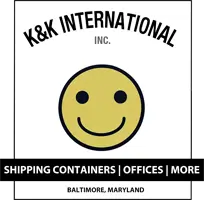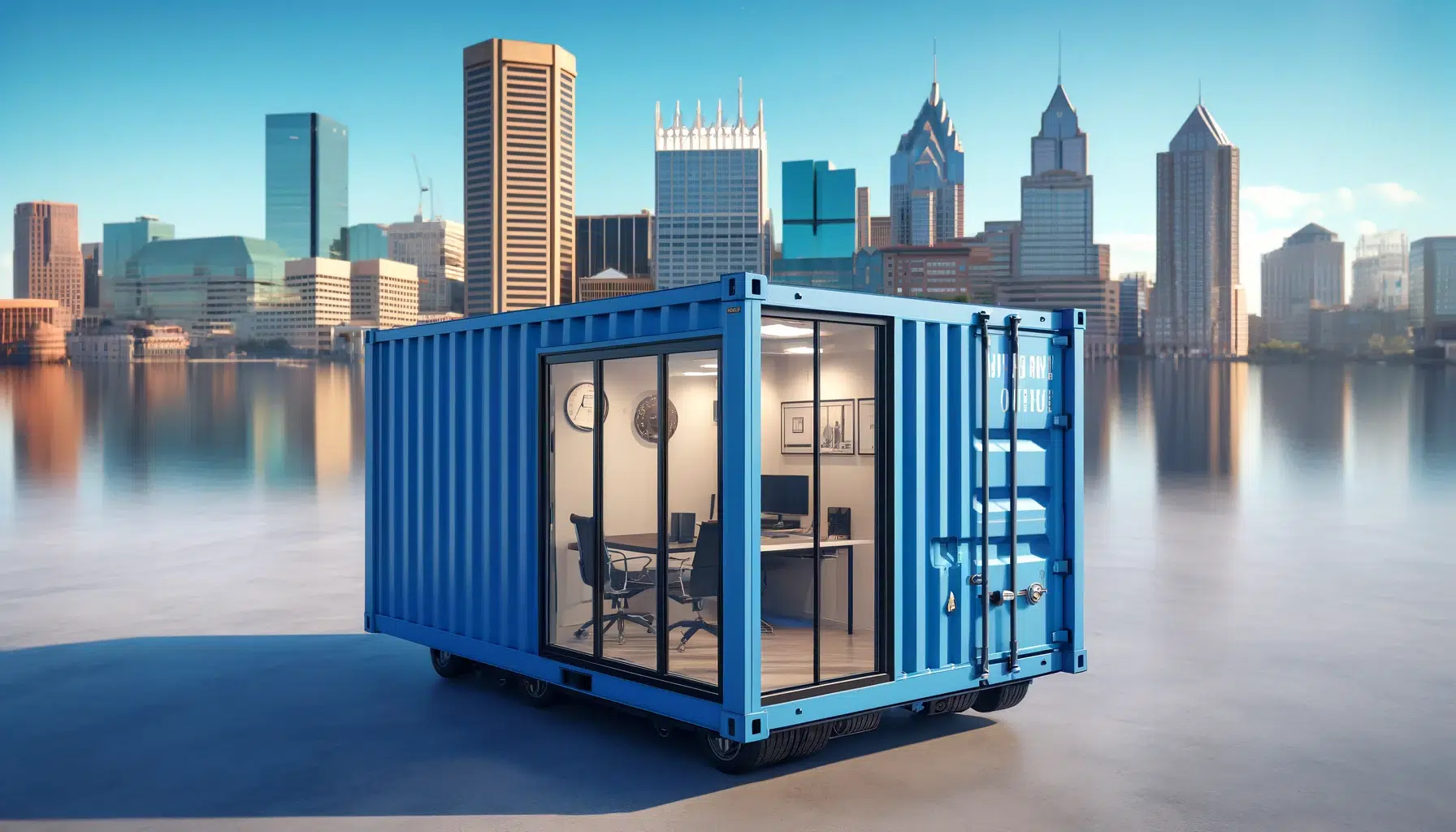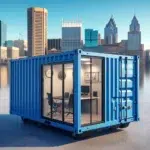Shipping container workshops have gained increasing popularity as a cost-effective and flexible solution for various industries. These workshops utilize repurposed shipping containers, offering unique features and benefits that strike a balance between power and convenience. As a result, they have become a preferred choice for businesses looking for versatile workshop spaces that deliver both functionality and efficiency.
Shipping container workshops provide businesses with the opportunity to have a workshop space that meets their specific needs while also being portable and adaptable. The rise of shipping container workshops can be attributed to their numerous advantages, including cost-effectiveness, portability, and sustainability. These workshops offer businesses the ability to quickly set up and customize their workshop spaces, reducing construction costs and providing flexibility to adapt to changing requirements.
For example, a construction company may need to set up a temporary workshop on a construction site. By using a shipping container workshop, they can quickly transport the container to the site and customize the interior to meet their specific needs.
This eliminates the need for costly and time-consuming construction, allowing the company to start working on the project immediately. The convenience and efficiency of shipping container workshops make them an attractive option for businesses in various industries.
The advantages of shipping container workshops go beyond their convenience. They also offer significant cost-effectiveness compared to traditional workshops.
The use of shipping containers as ready-made structures reduces construction costs. Furthermore, these containers are known for their durability, resulting in reduced maintenance and repair expenses over time. This cost-effectiveness makes shipping container workshops an appealing option for businesses, especially those with limited budgets or those looking to optimize their expenses.
Another advantage of shipping container workshops is their energy efficiency. These workshops can be designed to optimize insulation, leading to potential savings on utility bills.
For example, a shipping container workshop can be insulated with high-quality materials that regulate temperature and reduce noise. This not only creates a comfortable working environment for employees but also helps to minimize energy consumption. By reducing the need for heating or cooling, businesses can save money on energy costs and reduce their environmental impact.
Advantages of Shipping Container Workshops
One of the key advantages of shipping container workshops is their portability and flexibility. Due to the standardized size and structure of shipping containers, they can be easily transported and installed on-site.
This allows for quick setup and customization options, enabling businesses to establish efficient workflows. For example, a construction company may need to move their workshop to a different construction site as the project progresses. By using a shipping container workshop, they can easily transport the container to the new site and continue working without any disruptions. This flexibility allows businesses to optimize their operations and be more responsive to the needs of their clients.
The portability of shipping container workshops offers businesses the flexibility to adapt to changing requirements. They can be relocated in response to changing business needs or site requirements. Transportation can be done via trucks, ships, or rail, providing accessibility even to remote areas.
For businesses that operate in multiple locations or need to move their workshops frequently, shipping container workshops provide a practical and convenient solution. This ability to easily transport and set up workshops in different locations enhances the operational efficiency of businesses.
Shipping container workshops are adaptable for both temporary and permanent use. They can be customized to meet specific needs and are suitable for short-term projects as well as long-term workshop requirements.
This adaptability allows businesses to expand or downsize their workshop space as necessary. For example, a small business that experiences growth can easily add more shipping containers to their workshop to accommodate the increased demand.
On the other hand, a business that downsizes can sell or lease their shipping container workshop to another business, ensuring that the space is utilized efficiently. This flexibility in usage makes shipping container workshops a versatile choice for businesses with evolving needs.
The portability and flexibility of shipping container workshops provide businesses with the freedom to adapt to changing requirements and optimize their operations. Whether it’s a temporary project or a long-term workshop space, shipping container workshops offer the convenience and adaptability that businesses need.
Design Considerations for Shipping Container Workshops
When designing a shipping container workshop, several factors should be taken into consideration. Proper insulation and ventilation are crucial for creating a comfortable working environment. Effective insulation materials can help regulate temperature and reduce noise, ensuring a pleasant atmosphere for workers.
Ventilation systems are also essential to ensure proper air circulation and prevent humidity-related issues. For example, a shipping container workshop that operates in a hot and humid climate can benefit from a well-designed ventilation system that promotes airflow and minimizes the risk of humidity-related problems.
Adequate lighting and electrical wiring are essential aspects of workshop design. LED lighting options are recommended for their energy efficiency and excellent illumination.
Expert electrical installation is necessary to meet safety standards and accommodate workshop equipment. Proper lighting and electrical wiring are crucial for creating a safe and efficient working environment. For example, a manufacturing workshop that requires precise work may need specialized lighting to ensure good visibility and accuracy.
Optimizing space utilization and layout is another important consideration when designing a shipping container workshop. Smart storage solutions and efficient organization techniques should be implemented, and creative use of vertical space through shelves, racks, and mezzanine levels can maximize the available area.
For example, a woodworking workshop can benefit from custom-built storage solutions that utilize the vertical space to store materials and tools. Efficient space utilization and organization techniques enhance productivity and create a well-structured working environment.
The design of a shipping container workshop plays a crucial role in its functionality and efficiency. Proper insulation, ventilation, lighting, and space utilization are key considerations that contribute to a comfortable and productive working environment. By carefully designing the workshop space, businesses can optimize their workflow and create an environment that enhances productivity and employee satisfaction.
Portability and Convenience
One of the standout features of shipping container workshops is their portability. These workshops can be easily transported to different locations, offering businesses the flexibility to move their workshops as needed.
This is particularly beneficial for businesses that operate in remote areas or have projects in different locations. The ability to access and set up workshops in various locations provides businesses with convenience and accessibility. For example, a construction company that takes on projects in different cities can easily transport their shipping container workshop to each project site, eliminating the need for multiple workshops.
Relocation and setup of shipping container workshops are quick processes that do not require extensive construction. The standardized size and structure of shipping containers allow for easy transportation and on-site installation.
This means that businesses can quickly assemble or disassemble their workshops without the need for extensive construction work. This saves time and resources, allowing businesses to focus on their core operations. For example, a business that needs to set up a temporary workshop for a short-term project can quickly assemble the shipping container workshop on-site and start working immediately.
Shipping container workshops offer adaptability for both temporary and permanent use. They can be easily customized to meet the specific needs of businesses and projects.
This adaptability allows businesses to respond to changing requirements and adjust the size or layout of their workshop space. For example, a business that experiences growth can easily expand their shipping container workshop by adding more containers.
On the other hand, a business that downsizes can sell or lease their shipping container workshop, ensuring that the space is utilized efficiently. This adaptability makes shipping container workshops a versatile choice for businesses with evolving needs.
The portability and convenience of shipping container workshops provide businesses with the flexibility to access different locations and adapt to changing requirements. The quick assembly and disassembly process, along with the adaptability for temporary or permanent use, make shipping container workshops a practical and convenient option for businesses in various industries.
Sustainability Aspects
Shipping container workshops contribute to sustainability efforts in several ways. By utilizing decommissioned shipping containers, these workshops promote recycling and repurposing, reducing waste and minimizing the need for new construction.
This helps to conserve resources and reduce the environmental impact of workshop construction. For example, a business that chooses to use a shipping container workshop instead of building a traditional workshop from scratch is contributing to waste reduction and resource conservation.
The construction of shipping container workshops typically involves reduced energy consumption compared to traditional workshops, resulting in a lower carbon footprint. The use of repurposed shipping containers eliminates the need for new construction materials and reduces the energy required for manufacturing new building components.
Furthermore, shipping container workshops can integrate renewable energy sources such as solar panels to further minimize carbon emissions. For example, a shipping container workshop can be equipped with solar panels on its roof, allowing it to generate renewable energy and reduce reliance on non-renewable energy sources.
Water and resource management are also important considerations for sustainable shipping container workshops. Incorporating rainwater harvesting systems can promote water conservation by collecting rainwater for non-potable uses such as irrigation or toilet flushing.
Efficient use of resources can be achieved by implementing green building techniques, such as using recycled or sustainable materials for insulation and finishes. For example, a shipping container workshop can utilize recycled insulation materials and eco-friendly finishes to reduce waste and minimize the environmental impact of the workshop.
Shipping container workshops offer businesses a sustainable alternative to traditional workshops. By repurposing shipping containers and incorporating sustainable features, businesses can reduce waste, conserve resources, and minimize their environmental footprint.
The use of renewable energy sources and green building techniques further enhances the sustainability of shipping container workshops. By choosing a sustainable workshop solution, businesses can demonstrate their commitment to environmental responsibility and contribute to a greener future.
Case Studies: Successful Shipping Container Workshops
There are numerous successful examples of shipping container workshops across various industries. These workshops have been transformed into art studios, maker spaces, and pop-up shops, showcasing innovative designs and creative uses.
For example, the Puma City project transformed shipping containers into a mobile retail space, allowing the company to showcase its products in different cities around the world. The Puma City project highlights the adaptability and versatility of shipping container workshops in the retail industry.
Industries such as construction, automotive, and creative arts have embraced shipping container workshops and have experienced benefits in terms of cost savings, operational efficiency, and adaptability. For example, a construction company that uses shipping container workshops on their job sites can save on construction costs and easily relocate the workshops as the projects progress. This flexibility allows them to efficiently manage their operations and respond to changing project requirements.
Notable achievements and awards have been received by exceptional shipping container workshop projects, recognizing their outstanding design, sustainability initiatives, or community impact. For example, the ReSTART project in Seattle, Washington, received recognition for its innovative design and sustainable features. This project transformed shipping containers into a coworking space for technology professionals, providing a unique and eco-friendly workspace.
These successful case studies highlight the potential of shipping container workshops to transform spaces and create innovative solutions. From retail spaces to coworking spaces, shipping container workshops have proven to be adaptable and cost-effective options for businesses and communities. By showcasing these examples, businesses can gain inspiration and insights into how they can leverage shipping container workshops to meet their specific needs and stand out in their respective industries.
In conclusion, successful case studies demonstrate the practicality and benefits of shipping container workshops across various industries. These workshops have the potential to transform spaces, enhance operational efficiency, and contribute to sustainable practices. By embracing the innovative and adaptable nature of shipping container workshops, businesses can create unique workshop spaces that meet their specific needs and drive success in their industry.
Limitations and Drawbacks
While shipping container workshops offer many advantages, there are also limitations and drawbacks to consider. Space limitations can be a challenge for larger workshops or those requiring specialized equipment.
Careful planning is necessary to ensure sufficient square footage and a well-organized layout. For example, a manufacturing workshop that requires large machinery may need multiple shipping containers to accommodate the equipment and provide enough space for employees to work safely and efficiently. Despite this limitation, proper planning and design can help overcome space constraints and optimize the functionality of the workshop.
Insulation challenges may arise in extreme climates, requiring suitable insulation and climate control systems to maintain comfortable temperatures. Shipping containers are made of steel, which conducts heat and cold.
Without proper insulation, the workshop may become too hot or too cold, making it uncomfortable for employees to work. To address this limitation, businesses can invest in high-quality insulation materials and climate control systems to regulate the temperature inside the workshop. By ensuring proper insulation and climate control, businesses can create a comfortable working environment for their employees in any climate.
Regulatory considerations and permits should also be taken into account to comply with local building codes and zoning restrictions. Depending on the location and intended use of the workshop, businesses may need to obtain permits and meet specific requirements.
For example, a shipping container workshop that is intended for commercial use may need to comply with fire safety regulations and accessibility standards. It is important for businesses to research and understand the regulatory considerations before investing in a shipping container workshop to avoid any legal issues or delays in the construction process. By ensuring compliance with regulations, businesses can avoid potential setbacks and ensure the smooth operation of their workshop.
While shipping container workshops offer numerous advantages, there are limitations and drawbacks that businesses should consider. Space limitations, insulation challenges, and regulatory considerations are important factors to address when planning a shipping container workshop. By carefully addressing these limitations and drawbacks, businesses can overcome challenges and create a workshop space that meets their specific needs and complies with regulations.
Maintenance and Durability
Proper maintenance and durability are essential for shipping container workshops. Regular inspection and maintenance are necessary to identify and address any signs of corrosion. Applying appropriate sealants and coatings can protect the container from environmental elements.
For example, a shipping container workshop located in a coastal area may require more frequent inspections and maintenance due to the exposure to saltwater. By regularly inspecting the workshop and applying appropriate coatings, businesses can ensure the longevity and durability of the shipping container.
Periodic structural assessments should be conducted to ensure the workshop remains safe for occupants. Shipping containers are designed to withstand the rigors of transportation, but regular assessments can identify any structural issues that may arise over time.
Addressing any potential issues promptly helps maintain the durability and longevity of the shipping container workshop. For example, a shipping container workshop that has been in use for several years should undergo a thorough structural assessment to identify any signs of wear and tear.
Functional and aesthetic maintenance is also important for shipping container workshops. Cleaning the workshop regularly can help remove dirt and debris that can accumulate over time.
Additionally, painting the container and refurbishing the interior can help maintain the appearance of the workshop and create a pleasant working environment for employees. Regular upkeep of interior features and equipment ensures optimal functionality and extends the lifespan of the workshop. For example, a woodworking workshop may require regular cleaning and maintenance of equipment to ensure smooth operation and prevent any safety hazards.
In conclusion, proper maintenance and durability are crucial for shipping container workshops. Regular inspections, structural assessments, and functional/aesthetic maintenance help ensure the safety, longevity, and efficiency of the workshop. By investing in maintenance, businesses can protect their investment and create a conducive working environment for their employees.
Examples of Innovative Shipping Container Workshop Designs
There are various examples of innovative shipping container workshop designs that showcase creativity and functionality. Aesthetic modifications and exterior finishes can enhance the visual appeal of workshops, with the use of vibrant colors or branding elements.
Creative cladding materials or artistic interventions can also add a unique touch. For example, a shipping container workshop that is used as an art studio can be painted with vibrant colors to reflect the creativity that happens inside the workshop. This not only enhances the visual appeal of the workshop but also creates a distinctive identity for the business.
Interior layout and organization ideas can inspire efficient use of space, with smart storage solutions, ergonomic workstations, and versatile equipment arrangements. For example, a woodworking workshop can benefit from custom-built storage solutions that optimize space and keep tools and materials organized and easily accessible.
Ergonomic workstations can be designed to reduce strain and improve productivity. By optimizing the interior layout of the workshop, businesses can create a space that maximizes efficiency and supports the workflow of employees.
Sustainable features and technologies can be integrated into shipping container workshops, further enhancing their functionality and environmental friendliness. This can include green roofs, solar panels, rainwater harvesting systems, and energy-efficient appliances.
For example, a shipping container workshop can be equipped with a green roof that not only adds visual appeal but also helps to insulate the workshop and reduce stormwater runoff. Solar panels can generate renewable energy, reducing reliance on non-renewable energy sources.
Rainwater harvesting systems can collect rainwater for non-potable uses, conserving water. By incorporating these sustainable features and technologies, businesses can create workshops that align with their environmental values and promote a greener future.
Innovative shipping container workshop designs can enhance functionality, aesthetics, and sustainability. Aesthetic modifications, interior layout optimization, and the integration of sustainable features all contribute to creating a workshop space that meets the specific needs of businesses while minimizing the environmental impact. By incorporating innovative design elements, businesses can create unique workshop spaces that inspire productivity, creativity, and sustainability.
Embracing the Power and Convenience of Shipping Container Workshops
Shipping container workshops offer a compelling solution that balances power and convenience for businesses in various industries. Their advantages, including portability, cost-effectiveness, and sustainability, make them an attractive choice for workshop needs.
By considering the design considerations, maintenance requirements, and innovative examples, businesses can fully embrace the potential of shipping container workshops and enjoy the benefits they bring. Embracing this versatile solution can lead to increased creativity, efficiency, and reduced environmental impact.
Shipping container workshops offer a powerful and convenient solution for businesses looking to optimize their workshop spaces. Ready to start yours? Request your quote now and we’ll respond within two to three business days.









